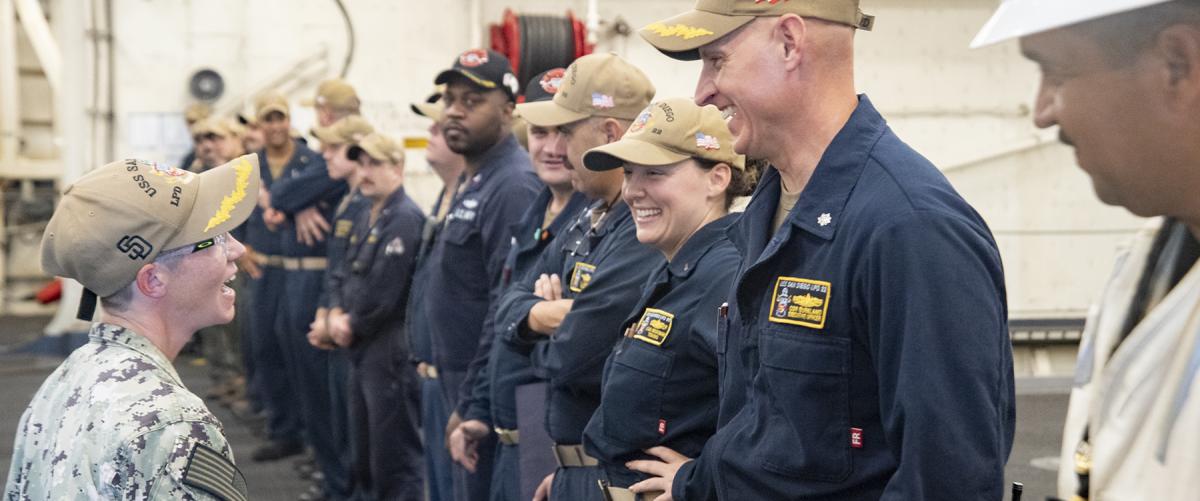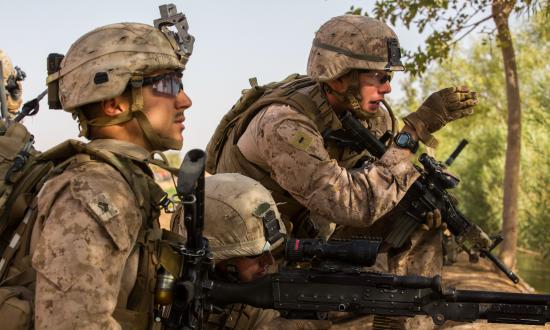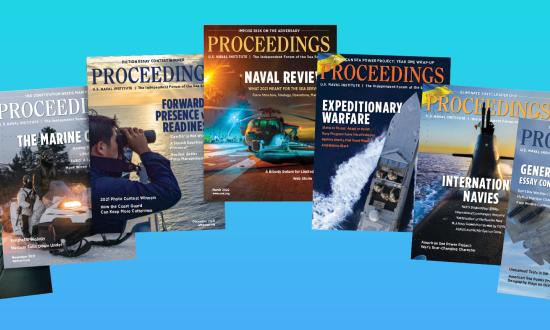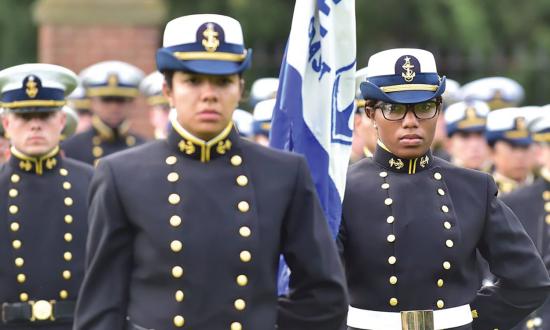One of my colleagues put the 1MC mic in my hand. It was my turn to say something to the crew. I meant to thank them for hosting us on the training run and give them some encouragement as they prepared to continue their three-month ballistic-missile submarine (SSBN) strategic deterrent patrol. However, I was notoriously bad at this part. I had never been good at talking to people in public—and even less so over general announcing circuits.
I checked my notes, where I had scribbled three bullet points:
- Thank you for hosting us; it’s clear you’ve been training hard, and our team was impressed with how well prepared you were.
- You have an important job that often doesn’t seem glamorous, but because of you, our family and friends can sleep well at night.
- The biggest thing preventing our enemies from attacking us today is the watch you stand day in and day out.
I cleared my throat and looked nervously around the SSBN’s control room. A dozen pairs of eyes locked onto mine. A couple of grins even lit up the faces of particularly salty sailors who knew mid-grade officers on 1MCs have a habit of turning into buffoons the second they start speaking. An ensign I had befriended during the ride advised me, “Whatever you do, sir, don’t say that we are ‘America’s strategic safety blanket.’ One of the last riders said that and everyone wanted to vomit.” Well, great. That ruled out bullet points two and three.
“Point taken,” I said, as I crossed out two-thirds of my notes. I read out the first point on my list, added, “Good luck out there. You’ll do fantastic,” and then unkeyed the mic. “Short and sweet,” I shrugged, walking toward the hatch to leave. “Good job, sir,” said the ensign.
The Importance of Public Speaking
Public speaking is an important skill for naval leaders, though many find it difficult. This is no surprise, given that 74 percent of Americans suffer from speech anxiety.1 Likely a result of prehistoric humans’ fear of being watched, public speaking can be a stumbling block for otherwise good leaders, preventing them from communicating their vision and inspiring their subordinates.
The naval profession affords its leaders many opportunities for public speaking, from exhorting a team to perform in battle to communicating strategic vision. The Naval Officer’s Guide tells us that “Making a Speech” is a key communication skill for officers.2 Seagoing commands frequently hold “quarters” to gather the crew together so command leaders can talk to their sailors face-to-face.
A leader’s public speaking skills will, to some extent, influence his or her unit’s cohesion and morale. Like it or not, sailors will use these occasions to judge their leaders’ capabilities. Speaking to sailors is thus an unavoidable high-risk, high-reward affair. Great naval leaders can use speaking opportunities such as quarters to inspire their people and get their buy-in for command priorities and strategies. However, poor communicators risk losing their audience’s attention. Worse, they can lose their sailors’ trust by speaking poorly or unwittingly saying something offensive or insulting.
Practical Experience
Public speaking cannot be learned solely from books; much of it comes through practice and experience. Of course, there are classes on public speaking at the U.S. Naval Academy and other universities, but these courses are primers at best. The only way to get better at public speaking is to embrace every speaking opportunity as a chance to learn and grow.
When I was starting out as a division officer, I made the mistake of thinking I had to move mountains when I spoke to my sailors. First, I tried complimenting them, telling them how proud I was of the work they were doing. While the sailors appreciated this, it failed to leave a lasting impression; it was cheap, and they knew it. I tried psyching them up before a difficult task. This never succeeded, either. I tried to relate their jobs to what I knew about geopolitics—how they were tiny cogs in a larger machine called the “defense enterprise” that was responsible for ensuring victory in something called “great power competition.” I told them that without their contribution, no matter how small, the national defense enterprise would fail. This approach rarely resonated with them. I found that while sailors do want to know their job is important within the big picture, the grandiose ideas of geostrategy matter less to them than things that touch their day-to-day lives.
The instinct to talk to my sailors like this probably came from my consumption of history and pop culture. After all, history is replete with examples of military leaders talking to their men, as did Napoleon before Marengo (“Will you permit the army to escape which has carried terror into your families? You will not!”) and Eisenhower before D-Day (“The eyes of the world are upon you!”). I remember being in awe the first time I heard the St. Crispin’s Day speech from Shakespeare’s Henry V, where the eponymous king encourages his men on the eve of the Battle of Agincourt:
This story shall the good man teach his son;
And Crispin Crispian shall ne'er go by,
From this day to the ending of the world,
But we in it shall be rememberèd—
We few, we happy few, we band of brothers;
For he to-day that sheds his blood with me
Shall be my brother . . .
I imagined myself at quarters on the pier like Captain Frank Ramsey (played by Gene Hackman), commanding officer of the USS Alabama in the 1995 film Crimson Tide, in the rain and the dark, exhorting his crew: “We constitute the front line and the last line of defense! I expect and demand your very best. Anything less, and you should've joined the Air Force!” Of course, the crew would chuckle raucously just like in the movie.
I learned very fast that talking to groups of sailors like this is ineffective. The electrician’s mate who just spent his last night in port before an underway finishing an arduous repair on a critical piece of equipment probably will have little interest in being told that I expect the best from him. I thus learned from the school of hard knocks—which came in the form of yawns and rolling eyes—that such speeches should probably stay in the movies.
Where, then, did that leave me? I knew from the Naval Officer’s Guide that “for the novice speaker, the best method to ensure you give a relaxed, professional delivery is to rehearse extensively.”3 Simple enough. But while this guidance is meant to help that novice speaker do well delivering his or her message, it is silent on what that message should be. The challenge for military professionals is as much in knowing what to say as in how to say it smoothly.
Know Your Audience
Connecting with the audience is one of the keys to effective public speaking. What I failed to learn early on was that unless I first understood the needs, desires, and aspirations of my sailors, there were no magic words that would have motivated them.
When this finally clicked for me, I realized I had been trying to talk to my sailors when I should have been talking with them. This meant talking with them daily to understand their personal and professional struggles and desires; sharing my knowledge about the mission and the sacrifices we all would have to make to accomplish it; understanding the barriers that stood between them and the job they needed to do; and mentoring them. Talking with my sailors was the real key to becoming empathic, to understanding their needs, and ultimately to connecting with my audience.
Sometimes, speaking with your people is as simple as asking them how their weekend went on a Monday morning or how their family has been doing. Then—and this cannot be stressed enough—listening with a genuine, deep interest to the answer, with no intent to reply or one-up. Not only is active listening one of the most important habits a person can cultivate, but it also demonstrates authenticity. This can be hard for the busy leader who is rushing to the next appointment or meeting, but it is essential.
For the leaders from history and popular culture—the Napoleons, the Eisenhowers, the King Henrys, and even the Captain Ramseys—effective communication did not come from stringing together beautiful words and phrases: It came from the fact that they had already been in the trenches with their people. Their words were inspirational because they represented the sacrifice of leadership; they held meaning for the audience because they saw that their leaders were with them, that they cared for them.
Am I any good at speaking in public today? Not as much as I wish I were. I still have a lot of work to do to improve my cadence, delivery, and style. I need to say fewer filler words. Yet, I have come to believe none of that really matters. Even if a leader were terrible at speaking, their people would still love them if they had taken the time before the speech to talk—and struggle and suffer and persevere—with them. That love and mutual respect and trust between the leader and those they lead is the thing that inspires.
Next time you are preparing to give a speech, remember that to get good at talking to your people, you must talk with them first. Knowing the audience, the most important aspect of public speaking, means getting to know them. In nowhere but the military is it as much a privilege to do just that.
1. John Bowe, I Have Something to Say: Mastering the Art of Public Speaking in an Age of Disconnection (New York: Random House, 2020), 12.
2. Lesa McComas, The Naval Officer’s Guide (Annapolis, MD: Naval Institute Press, 2011), 95.
3. McComas, The Naval Officer’s Guide, 95.






